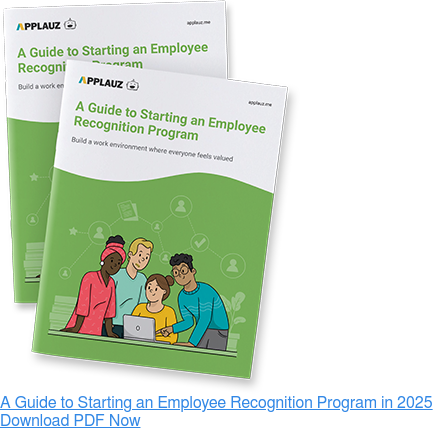Are you a manager or leader in your company?
If so, you are likely aware of the importance of giving your employees recognition.
Company executives and HR depend on you to make sure employees are feeling valued and appreciated.
In other words, managers are expected to be the instigators of employee recognition -- especially the type of praise that is "unstructured" and spontaneous.
Yet, many managers struggle with finding the time to give frequent recognition .
.
Why does this happen?
You know it's important, but you find yourself stuck
It can be tricky for busy managers to make time for recognition. To add to the lack of time, you might have doubts about giving recognition, such as:
- What should I even say?
- Is this a good reason to give recognition?
- Will it feel sincere?
As a result, you probably give a lot less recognition than you know you should. And when you do share appreciation, you probably stick to what's “safe.”
For example, deferring to giving the classic "good job on X" or "way to go, team," reserving your recognition for notable achievements only.
Making recognition simple
In the end, recognition is often hampered by not knowing what actions to recognize. This is especially true in the context of using a digital platform for recognition, like Applauz.
The solution to removing these barriers is simple.
In this article, we’ll help do just that -- we’ll explore all the types of actions, big and small, that warrant appreciation and recognition from a manager. As a result, you’ll be ready to give frequent recognition that is both meaningful and effective.

10 reasons to give employees recognition (other than to say good job)
Highlight the quality of the work
Early in my career, I worked as a team leader in customer service. As a team leader, I had access to any positive reviews left by happy customers.
Every Friday, I would pick a couple of the best reviews from the week and send them out to the entire team. The goal was to publicly recognize agents who delivered quality service and to keep team morale high.
Employees loved having one of their positive reviews broadcast in my weekly "recognition" emails.
On the flip side, I noticed recognizing agents only for their speed and efficiency; for example, "Jane closed x amount of tickets this week" was less impactful. In fact, it sometimes made employees who took time to give personalized service feel resentful.
What I learnt from this exercise was that virtually any employee could complete a task if you ask them. But what makes great employees stand out is the effort and time they put into their work. And, that is precisely what most employees want to be recognized for -- their effort and not the result.
Give recognition during an assignment or project
Timely recognition is everything. Think about the difference between receiving a heartfelt appreciation upon delivering a project versus getting praise weeks (or even months) later during a formal review. Making sure that recognition is timely is a critical factor in giving employees effective recognition.
That said, recognition shouldn't only be about praising the completion of an action. Recognition should also be about showing encouragement and support.
Consequently, giving recognition during an assignment can be a powerful way to show employees your support and appreciation.
This underused type of recognition will always be well received by employees who are likely stressed and working hard to get a large mandate delivered. In other words, it's when employees are weathering a harsh storm that words of encouragement from a manager are most appreciated but are often the least received!
Show support for personal goals or achievements
We work over 40 hours with our coworkers. Over time, we often get to know them well. We begin to understand them as people and learn about their passions, interests, and hobbies.
To that end, giving recognition doesn't always need to be directly related to work. This is especially true if you're giving recognition using a software or recognition tool like Applauz.
You can show encouragement and support for your employees' personal goals as well.
For example:
- Hitting an important life milestone like marriage, a new baby, or a new house.
- Working on personal goals, passions, or creative projects. For example, running a marathon or starting a Youtube channel or blog.
- Volunteering or charitable work.
- Extra educational and learning efforts they take on the side.
Highlighting these personal ambitions will achieve two important things.
First, it will make employees feel genuinely seen and valued like you truly understand them. And it will also help members get to know each other indirectly. This can be very helpful to keep connections strong if your teams are working from home.
Say something nice about employees' soft skills
Big work achievements are essential. But they shouldn't be the only thing that makes people feel valued. Sometimes giving recognition means simply saying something nice from the heart.
Not to mention, if you only give performance-based recognition, you are missing meaningful opportunities to support and encourage your employees when they need it the most.
That said, if you're used to giving performance-based recognition, you might be at a loss of what to say.
Focus on the character traits of your employees. In short, the things that hold in good and bad times. Here are some common examples:
- Curiosity
- Creativity
- Kindness
- Generosity
- Ambition
- Resourcefulness
- Tenacity
- Sense of humour
- Good attitude
- Critical thinking
- Commitment
These positive words of encouragement will uplift them and carry them through difficult times. And the support and empathy you showed will stay with them during good times as well.
Show support for new ideas and taking initiative
Traditionally, recognition is offered to employees for completing an official project, mandate, or assignment. However, in the modern workplace, employees are often wearing many hats. They take initiative or come up with new ideas and ways of doing things.
At the very least, it's common to find employees taking on more responsibility and work because there simply aren't enough resources.
Bottom line: Whether an employee is taking initiative with new ideas or increasing their workload, managers must recognize when employees go above and beyond their main job responsibilities.
New employees or newly promoted people are eager to take this type of initiative. After all, they want to make a good impression.
In the early days, overlooking these efforts or taking them for granted can quickly lead to an employee feeling underappreciated. As a result, the employee who feels undervalued will decrease their effort. Worse, they will end up with an employee who is disengaged and only does the minimum of what's required.
Recognize employees for embodying your company values
Recognizing employees who live your company values is a great way to show appreciation. As a result, you can add some variety to your recognition. In other words, praise won't always be about business performance or company objectives.
- For example, if one of your company values is "trust" or "accountability," and your employees did something that truly exemplified those values -- acknowledge it publicly!
Remember: Declaring your company values is not always enough; reinforcing them is equally important. In practice, this means celebrating employees who embody these important principles you are trying to promote.
Showcase and recognize promotions
An employee promotion is an ideal time to give public recognition. If you have a peer recognition program, announcing it on a company Newsfeed can be very effective and motivating for the employee receiving the promotion.
When making a promotion announcement, you want to add a few extra words about the employees, for example:
- Highlight the major results/accomplishments that brought them to this new position.
- Mention some key qualities that made them earn the promotion.
- Give details about their new role.
A promotion is a crucial milestone in someone's professional life. Taking the time to craft a meaningful message or small announcement speech will ensure your appreciation feels impactful and sincere. And the employee will start their new opportunity feeling valued, appreciated, and on the right track.
Recognize cooperation and teamwork
When we think of employee recognition, we often think of a manager giving recognition to a single employee. However, managers should also give recognition to a group of employees. Suppose you work in an environment where group work and collaboration are common. In that case, there are many opportunities to give shout-outs to teams working well together delivering great work.
You can even recognize cooperation between only two employees. For example, I noticed Joshua helping Alica on this particular project. I love seeing you guys work together and helping each other out!
Recognition isn't just about highlighting a big achievement. You also want to show support for any actions that are positive or sustain your team values.
Moreover, recognizing teamwork can be very helpful if your team has gone through a recent conflict. Focusing on praising these positive actions is the best way to show your team what you value and strengthen those model actions.
Acknowledge work anniversaries
Your company may already have a work anniversary program in place. However, If they do, it's likely, your company is only celebrating more significant milestones like the five or ten years.
That said, whether your company has an official program in place or not, work tenures are becoming shorter. As such, managers should be independently responsible for recognizing "in-between" milestones like one and three-year anniversaries.
You can reach out to HR to find out the hire dates of your team and plug them into your calendar. Or if you have a system like Applauz, it will take care of that for you!
No matter the system, the goal is the same: publicly recognize employees on their work anniversary.
Make sure to highlight some key accomplishments or results they achieved in the past year. And to point out some of the reasons you love having them on your team, such as a great attitude or sense of humour.
Showcase major victories and outstanding results or performance
We saved the most obvious for last. When employees deliver a major assignment or project, it's a cause for celebration. This is the most traditional way to give employee recognition. And at the very minimum, managers should recognize these larger achievements on time and not wait for a quarterly or yearly review to give praise.
Working hard on a large goal is draining. Giving timely recognition reinforces the achievement. As a result, employees are likely to feel valued and appreciated. This feeling will energize them and give them the boost they need to continue onto the next task.
On the other hand, if managers fail to recognize a large project, employees may feel their efforts are taken for granted. Consequently, their energy and enthusiasm will drop. Inevitably this attitude will impact the quality of their ongoing work and general attitude towards their job.
Final Thoughts
Look closely at a typical work week. Even if your team did not reach a significant goal, you would surely notice smaller actions, initiatives, or ideas that warrant appreciation and recognition from a manager.
Here's a quick recap of all the reasons you can give recognition:
- Highlight the quality of the work.
- Give recognition during an assignment or project.
- Show support for personal goals or achievements.
- Say something nice about employees' soft skills.
- Show support for new ideas and taking initiative.
- Recognize employees for embodying your company values.
- Showcase and recognize promotions.
- Recognize cooperation and teamwork.
- Acknowledge work anniversaries.
- Showcase major victories and outstanding results or performance.
Those less obvious actions are prime occasions for sharing your support and appreciation. And an effective recognition message doesn't need to be pages long, whether verbal or written. Just a few words that are specific and sincere can mean the world to a hard-working employee.
In the end, giving monthly recognition should not use a great deal of time. And remember, it will be time well spent, as recognition is one of the most affordable and powerful ways to keep people feeling valued, happy, and motivated.
About the author
 Michelle Cadieux
Michelle Cadieux
Michelle is a content writer for Applauz. She holds a Bachelor's degree in Psychology from Concordia University, and she has been writing about work and employee happiness for over five years.





